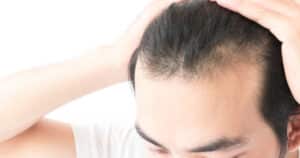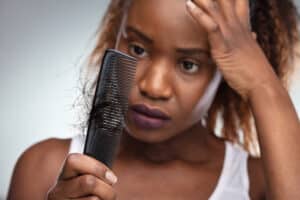Hair Disease Treatment in Dallas, TX

Hair disease can cause significant frustration and impact your confidence. At Dermatology Treatment and Research Center in Dallas, TX, we provide advanced care for various hair diseases, from genetic conditions to scalp disorders.
Led by Dr. Ross Radusky, a board-certified dermatologist and NYU School of Medicine graduate, our team is dedicated to offering effective clinical dermatology solutions for thinning hair, excessive shedding, scalp discomfort, and more.
What is Hair Disease?
Hair disease is the thinning or loss of hair on the body. It can occur in both men and women but more frequently in men.
If you suffer from hair loss or if it runs in your family, a consultation with an experienced dermatologist can help you learn more about hair loss prevention and treatment options.
What Causes Thinning Hair?
One of the most common causes of hair disease is genetics. This type of hair disease is known as hereditary hair disease, sometimes referred to as male-pattern baldness, female-pattern baldness, or androgenetic alopecia.
Other types include alopecia areata (an autoimmune condition), traction alopecia (caused by prolonged tension on hair follicles), and trichotillomania (a mental health condition characterized by an urge to pull out one’s hair).
While hair disease most commonly results from a genetic predisposition, other causes may include:
- Changes in hormones
- Certain medications (blood thinners, anti-depressants, etc.)
- Radiation therapy
- Stress
- Age
- Certain hairstyles, e.g., tight braids, tight ponytails
What Are the Symptoms of Hair Disease?
 Symptoms may vary depending on the type of hair disease and its underlying causes. You may notice signs of hair disease that occur slowly as you age or experience sudden symptoms. While hair disease is most common on the scalp, it can also affect other body areas, including the eyes and nasal cavity.
Symptoms may vary depending on the type of hair disease and its underlying causes. You may notice signs of hair disease that occur slowly as you age or experience sudden symptoms. While hair disease is most common on the scalp, it can also affect other body areas, including the eyes and nasal cavity.
Signs of hair disease may include:
- Slow thinning of hair at the scalp
- Patches of hair disease around the scalp
- Loose hair that falls out when combing, washing, or gently pulling the hair
How is Hair Disease Diagnosed?
To help diagnose hair disease and its cause, your doctor will review your medical history and any medications you are currently taking. They may also ask questions about when the symptoms began and whether hair loss runs in your family to determine potential causes.
When diagnosing the causes of hair disease in women, your doctor may ask about menstrual cycles, menopause, pregnancies, and other events that could cause hormonal changes.
What to Expect During Your Appointment
After reviewing your medical history and background, your provider will examine your hair and scalp. They may gently tug the hair to see how it reacts, referred to as a “pull test.” They may also examine other body regions to compare hair growth. Hair samples, as well as a scalp biopsy, can also help with further diagnosis.
How is Hair Disease Treated?
 While there may not be a cure for some types of hair disease, several treatment options are available for men and women to stop, delay, or cosmetically mask symptoms. Your provider can help determine if you are an appropriate candidate and recommend the best treatment options.
While there may not be a cure for some types of hair disease, several treatment options are available for men and women to stop, delay, or cosmetically mask symptoms. Your provider can help determine if you are an appropriate candidate and recommend the best treatment options.
Potential solutions may include:
- Rogaine
- Propecia (for men only)
- Oral contraceptives (for women only)
- Corticosteroids
- Hair transplant
- Scalp reduction
- Scalp expansion
- Scalp flaps
- Laser therapy
- Clinical trials
Hair Disease Prevention
Along with the above treatment options, your provider may recommend the following hair disease prevention tips:
- Avoid unnecessary rubbing during hair washing
- Use soft massaging to shampoo the scalp
- Allow water to naturally rinse the hair during shampooing
- Condition the hair after shampooing
- If you have straight hair, avoid combing the hair while it is wet
- If you have curly hair, comb the hair when it is damp
- Avoid hair blowers, hot combs, and hair irons
- Avoid hairstyles that tightly pull the hair
- Avoid placing weave or extensions in the hair
- Avoid damaging hair treatments, e.g., hair dye or hair perms
- Use a wide-tooth comb and avoid tugging or pulling the hair
Patient Testimonial
“As is usual, my experience was excellent. The people are courteous, friendly, appear and act effectively and efficiently. I have been a client some 17 years and have not ever had a bad experience.” – Juan A.
FAQs
What Role Does Diet Play in Maintaining Healthy Hair?
Diet is crucial to healthy hair. A well-balanced diet can help prevent hair thinning, breakage, and dryness. Deficiencies in certain vitamins and minerals can contribute to hair problems.
Essential nutrients for healthy hair include:
- Protein: Hair is primarily made of keratin, a protein. Consuming adequate protein from sources like eggs, fish, lean meats, legumes, and dairy helps strengthen hair and promote growth.
- Iron: Low iron levels can contribute to hair shedding. Iron-rich foods include red meat, spinach, lentils, and fortified cereals.
- Biotin (Vitamin B7): This vitamin supports keratin production and can help reduce hair brittleness. Biotin is found in eggs, nuts, and whole grains.
- Omega-3 Fatty Acids: These healthy fats support scalp hydration and reduce inflammation that may affect hair follicles. Good sources include salmon, walnuts, and flaxseeds.
- Zinc: Zinc is important for hair tissue growth and repair. It can be found in oysters, beef, chickpeas, and pumpkin seeds.
- Vitamin D: A vitamin D deficiency has been linked to hair loss. Sun exposure, fortified dairy products, and fatty fish are good sources.
- Vitamin E: This vitamin acts as an antioxidant to protect the scalp from oxidative stress. It's found in almonds, sunflower seeds, and avocados.
- Vitamin A: Vitamin A supports sebum production, the natural oil that keeps hair hydrated. Sweet potatoes, carrots, and leafy greens are rich sources.
It's also important to limit foods and drinks like:
- Highly processed foods: Can contribute to inflammation that affects hair follicles.
- Excess sugar: May cause hormonal imbalances that impact hair health.
- Alcohol and caffeine: Can lead to dehydration, affecting scalp moisture.
Are There Specific Occupations or Environments That Make People More Prone to Hair Diseases?
Some occupations and environments can increase the likelihood of developing hair diseases. Those who may be at risk include:
- Healthcare Workers and First Responders: Frequent use of tight head coverings (surgical caps, helmets) can cause traction alopecia. Long shifts and high stress levels may also contribute to stress-related hair shedding (telogen effluvium).
- Construction and Industrial Workers: Prolonged helmet use can create friction and pressure on the scalp, leading to hair thinning or scalp infections. Exposure to dust, debris, and chemicals may contribute to scalp irritation.
- Office and Remote Workers: Prolonged screen time and stress can increase cortisol levels, potentially contributing to stress-related hair loss. Sedentary lifestyles may also impact circulation to the scalp, affecting hair growth.
- Farmers and Outdoor Workers: Prolonged sun exposure can damage hair proteins and dry out the scalp, leading to brittle hair. Exposure to pesticides and environmental pollutants may contribute to hair and scalp irritation.
- Laboratory and Chemical Industry Workers: Exposure to harsh chemicals without proper protection can damage hair and scalp health. Some substances may disrupt hormonal balance, affecting hair growth.
Why Choose Dermatology Treatment and Research Center?
Dermatology Treatment and Research Center provides expert hair disease care under the direction of Dr. Ross Radusky, an award-winning board-certified dermatologist. Patients also benefit from the expertise of Heather Bailey, APRN, NP-C, a board-certified nurse practitioner with 20 years of experience.
The team is committed to delivering high-quality, innovative solutions in a welcoming and compassionate environment. Whether addressing hair thinning, scalp conditions, or other concerns, they prioritize patient-centered care and the latest advancements to achieve the best possible outcomes.
Schedule a Consultation in Dallas Today
If you are experiencing symptoms of hair disease that are interfering with your quality of life, a consultation with an experienced dermatologist can be essential in restoring the appearance and health of your scalp.
Our board-certified providers at Dermatology Treatment and Research Center hold unmatched clinical, cosmetic, and general dermatology expertise. They are ready to deliver expert care in a friendly and compassionate atmosphere.
Call 972.661.2729 or fill out the form on this page to book an appointment.